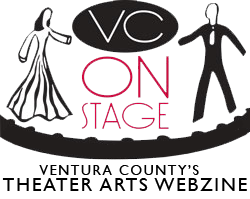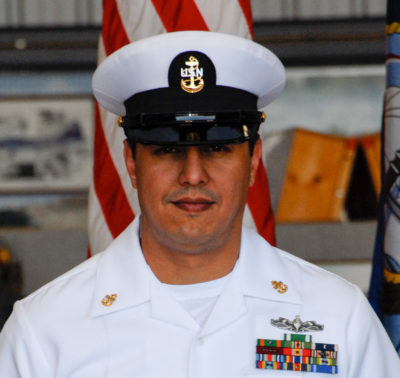Rarely does a director get to work on a play whose story is so much a part of his personal background and makeup, but when High Street Arts Center producers Ken Rayzor and Kathee Boyer chose the 1948 comedy Mister Roberts for their spring play, there was no doubt who would direct it. John Tedrick has been involved in High Street productions for many years as both an actor and director, but in Mister Roberts, he got to take advantage of his 20 years’ experience in the United States Navy to bring the story of Lieutenant J.G. Douglas Roberts to life. The play won a Tony Award for Henry Fonda, who later reprised his role in a popular 1955 motion picture, which also starred Jack Lemmon and William Powell. We talked with Tedrick recently at a Starbucks, where we were NOT ejected for not ordering anything.
VCOS: Did Ken Rayzor and Kathee Boyer know of your background before having you direct this play?
JOHN: Oh, sure. They were at my retirement ceremony in 2010. I had known them for a year-and-a-half at that point, so they were already friends of the family. Ken directed my first show but we had known them before that.
VCOS: Has this project been in the works for awhile then?
JOHN: I know that Ken has wanted to do it for a long time but he never mentioned it to me. He just picked it as part of his season and just sprung it on me. There was no way I could turn it down!
VCOS: Were you familiar with the show already?
JOHN: Oh, my dad was a fan of the movie with Henry Fonda so it was a movie that I remember seeing growing up. Being in the navy and watching a movie about the navy, it was like, OK, been there, done that.
VCOS: What were your impressions of the movie? Was it a fairly realistic depiction of what it was like from your point of view? It’s kind of a farce, but were there details that you recognized?
JOHN: Well, in the movie, they filmed it on a real ship and there were aspects of the officers’ stateroom and the captain’s stateroom that were definitely manufactured for the big screen, but in reality those staterooms were much smaller. That’s one of the things I try to convey in this show. We have a platform that we stage everything on and that’s about the size of an officer’s stateroom. So everything had to be on that platform to give the audience the idea of the tight quarters that everyone was in.
VCOS: Now this started as a stage play so were you able to research the staging of the original play?
JOHN: There was very little out there that I could find. There were four or five pictures of the actual staging of the original Broadway set. It was almost like they took a cutaway side shot of the ship but I couldn’t find anything about how they staged the different scenes. So I ended up fabricating all of it on the fly and figure out how to make the best use of that small staging area. It would have been great if I had a larger stage to work with all kinds of wing space and fly space, which I could have done a lot more with so we made the best use with what he had.
VCOS: Well, the smaller stage kind of works for the show because the idea is convey Mister Roberts’ stifling confinement, so a small stage kind of works to your advantage.
JOHN: Yeah. I think originally I wanted to stage the ship diagonally so that you’re looking across the bow and you’d have a sky curtain, but that was too limiting, so we ended up with a different kind of angle.
VCOS: Mister Roberts is basically a comedy but there are darker elements in it. How do you balance the two as a director.
JOHN: I’m not sure that I look at it in terms of darkness vs. comedy. I just wanted to project on the stage what the Navy was like and how these sailors live. I read the original novel and saw it on stage in Camarillo six or seven years ago, and I saw the movie, but most of all, I tried to inject my own twenty years of Navy experience into a somewhat accurate depiction of what it was really like to be on a ship.
VCOS: Did you do any research on Thomas Heggen, who wrote the novel and the play?
JOHN: I know that he died when he was 30. He drowned in his bathtub because he had driven himself crazy trying to write a second successful book and got into drinking and drugs and as a result didn’t live a very long life. But he was in the Navy and wrote the novel while he was on the USS Virgo and it’s just about his Navy experiences.
VCOS: How does the show compare to your experiences?
JOHN: There are moments when Dale Alpert, our captain, is really giving Roberts a piece of his mind and throughout the rehearsal process I kept telling Dale, “I don’t hate you enough. I don’t see that captain or that chief from when I was in the Navy, really laying into a sailor for messing up.” And I’d tell him, “I need more.” The captain is the villain of the piece.
VCOS: Is he supposed to have any redeeming qualities at all?
JOHN: No. When he has his big monolog in the final scene of Act I and he talks about being in the Merchant Service as a young guy and getting bossed around by these smart college boys, I wanted him to have a minute where you almost felt sorry for him – for a half a second. And you kind of feel where he’s coming from and why he is what he is.
VCOS: Did you know officers like that?
JOHN: By the time I got in, not so much. We had officers who weren’t college educated but they were LDOs or Chief Warrant Officers and they got where they were because they were really good leaders. But for the most part, the bulk of my bad leadership experiences came from chief petty officers. Not to throw my fellow brothers and sisters under the bus, but that’s where I had my really bad experiences, with chiefs and senior enlisted personnel. There are some bad officers that squeak through.
VCOS: Was tedium part of your experience like it is in the play? Doug Roberts is aching to get into the action of World War II and is stuck on this “bucket” as the USS Reluctant is called.
JOHN: Not so much. When I joined the Navy, I joined for a specific reason: to serve my country and get some training to make it my career. So it wasn’t a matter of thinking I wasn’t in the right place or not doing the right thing for me. But I can definitely relate to the tedium because I had guys who were like that. Desert Storm and the second Iraqi conflict were going on, but nothing where we would have the possibility of putting boots on the ground or anything like that.
VCOS: What about the camaraderie of the crew? Was that accurate?
JOHN: That was something that was very important to me. Everywhere I went, it was always about camaraderie, brotherhood or sisterhood. When you’re in that kind of an environment and you have the potential to go to war, you need to know that everybody has each other’s back. And that was one of the things that I tried to impress upon the cast, this element of watching out for each other. I think this plays pretty well in the show, especially between Mannion and Insigna.
VCOS: And it’s also the motivating factor for Roberts to get liberty for the crew, knowing that would bring everyone together.
JOHN: Right.
VCOS: Was there ever anyone like Doc who you knew?
JOHN: Doc is like anyone in life who is that mentor or that person you go to for advice. Everywhere you look in the Navy there was a guy like that. When I made chief, we were not just technical experts, but being that person for the sailors was part of our responsibility, taking the younger guys under our wing and showing them the way.
VCOS: Any other characters remind you of anyone in particular?
JOHN: Mostly the junior guys. Most of my vivid memories from being in the Navy involved going to sea with these guys and everyone was just trying to figure out what they wanted to do with their lives, they weren’t quite sure yet. So I saw what a lot of the young guys on the stage were doing, and I thought of all the port visits we’d go to and how we would go out and have fun. It’s kind of hard to describe. So I tried to impart a lot of those experiences to the cast. When we’re in Scene 5 of Act I and they’re getting ready to go out on liberty, I tried to tell them what it was like back then when they didn’t have the Internet. When you pulled into a port, you couldn’t just look up “Elysium” and find out what there was to do. First you’d try and find out who had been there before and pick their brain for what to do. And when we pulled into a port, everybody was outside, watching whatever city we were pulling into to eyeball things to do. I could talk for hours about that particular department.
VCOS: Well, it’s a beautifully written script and you had a lot to work with and your actors really fill their parts well, so congratulations on that.
JOHN: Yes, thanks.There were a few lines that I had to cut that might not have been appropriate for today’s audiences because of the misogyny of it so you have to either tone those down or eliminate them entirely. But I knew going in that it was a really good script that has stood the test of time. I mean, it’s been around since 1948 and still holds up very well.
*************************
Mister Roberts is currently playing at the High Street Arts Center in Moorpark. For dates and showtimes, see the VC On Stage Calendar.






James Bauer
•6 years ago
Really enjoyed the High Street adaption of ‘Mister Roberts.’ Ken Razor was brilliant in his selection of John Tedrick as director as Mr. / CPO Tedrick did an outstanding job. Well done, from one retired Navy-guy to another.